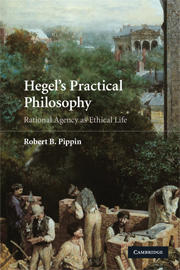5 - The freedom of the will: psychological dimensions
Published online by Cambridge University Press: 05 June 2012
Summary
Hegel's idea is that freedom does not involve being the center of causal agency, nor in merely being free from external constraints in satisfying what we happen to want, nor in conforming to or realizing the essence of human being as a distinct species, nor in being the vehicle for the self-realization of Cosmic spirit. This raises the stakes for him in coming up with a clear positive answer to the question because he certainly also thinks that everything of value in human life depends on actualizing freedom adequately. He thinks this because he believes that any value that gives my life meaning, secures a guiding commitment that can be sustained over time, makes possible genuinely “leading a life,” presupposes a Rousseauian point that Hegel fully accepts: that nothing can be a genuine value for me unless it can be a value to me; in his terms, unless I can recognize myself in what is proposed as a good for me, and that means: unless I am free. And he accepts a Kantian point that such identification or non-alienation requires a certain sort of responsiveness to reason; what sort being the central question. Being able to “stand behind” a deed with justificatory reasons is how I can claim the deed as my own or “own up to it.”
- Type
- Chapter
- Information
- Hegel's Practical PhilosophyRational Agency as Ethical Life, pp. 121 - 146Publisher: Cambridge University PressPrint publication year: 2008



